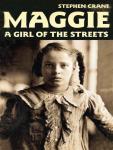
Maggie: A Girl of the Streets
by Stephen Crane
This book is an 1893 novella by American author Stephen Crane (1871–1900). The story centers on Maggie, a young girl from the Bowery who is driven to unfortunate circumstances by poverty and solitude. The work was considered risqué by publishers because of its literary realism and strong themes. Crane – who was 22 years old at the time – financed the book's publication himself, although the original 1893 edition was printed under the pseudonym Johnston Smith. After the success of 1895's The Red Badge of Courage, Maggie was reissued in 1896 with considerable changes and re-writing. The story is followed by George's Mother.
The story opens with Jimmie, at this point a young boy, trying to fight a gang of boys from an opposing neighborhood all by himself. He is saved by his friend, Pete, and comes home to his sister Maggie, his toddling brother Tommie, his brutal and drunken father and mother, Mary Johnson. The parents terrify the children until they are shuddering in the corner. Years pass, the father and Tommie die, and Jimmie hardens into a sneering, aggressive, cynical youth. He gets a job as a teamster, having no regard for anyone but firetrucks who would run him down. Maggie begins to work in a shirt factory, but her attempts to improve her life are undermined by her mother's drunken rages. Maggie begins to date Jimmie's friend Pete, who has a job as a bartender and seems a very fine fellow, convinced that he will help her escape the life she leads. He takes her to the theater and the museum. One night Jimmie and Mary accuse Maggie of "Goin to deh devil", essentially kicking her out of the tenement, throwing her lot in with Pete. Jimmie goes to Pete's bar and picks a fight with him (even though he himself has ruined other boys' sisters). As the neighbors continue to talk about Maggie, Jimmie and Mary decide to join them in badmouthing her instead of defending her. Later, Nellie, a "woman of brilliance and audacity" convinces Pete to leave Maggie, whom she calls "a little pale thing with no spirit." Thus abandoned, Maggie tries to return home but is rejected by her mother and scorned by the entire tenement. In a later scene, a prostitute, implied to be Maggie, wanders the streets, moving into progressively worse neighborhoods until, reaching the river, she is followed by a grotesque and shabby man. The next scene shows Pete drinking in a saloon with six fashionable women "of brilliance and audacity." He passes out, whereupon one, possibly Nellie, takes his money. In the final chapter, Jimmie tells his mother that Maggie is dead. The mother exclaims, ironically, as the neighbors comfort her, "I'll forgive her!"
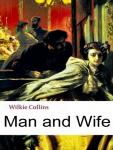
Man and Wife
by Wilkie Collins
In 1855, a clever young lawyer called Delamayn finds a loophole in the Irish marriage laws which enables John Vanborough to annul the marriage that stands in the way of his parliamentary ambitions. The abandoned wife, Anne Silvester, lives with her old friend, Blanche, married to Sir Thomas Lundie, together with their respective daughters, also called Anne and Blanche.
Twelve years later Vanborough, and Anne and Blanche senior are all dead. Sir Thomas has remarried but dies shortly after, when the title and estate pass to his likeable brother, Sir Patrick Lundie, a retired lawyer in his seventies. Sir Thomas is survived by his second wife, the overbearing Lady Lundie, now responsible for the two daughters. The lawyer, Delamayn, has succeeded in life and become Lord Holchester with two sons, Geoffrey and Julius.
The main action of the story begins in 1868 at Windygates, the Perthshire home of Lady Lundie. Blanche is now 18 and Anne, acting as her governess, 25. Visiting them are Sir Patrick; Arnold Brinkworth, engaged to Blanche; and Geoffrey Delamayn, the school friend who once saved Arnold's life. Geoffrey has promised to marry Anne but is now trying to break the secret engagement because he will be cut out of his father's will. Anne persuades him to accept a secret marriage and knowing a little of the Scottish law arranges to go to a lonely inn at Craig Fernie where she will announce that she is waiting for her husband. If Geoffrey arrives and openly asks for his wife, the presence of witnesses will validate the marriage according to Scottish law.
Geoffrey receives a telegram that his father is dangerously ill and must go to London with his brother. He therefore asks Arnold to deliver a message to Anne at the inn, carefully telling him not to use his own name but merely to ask for his 'wife'. Arnold reluctantly agrees but makes Geoffrey put the message in writing. The note, stating Geoffrey's intention to marry, is written on the back of a letter from Anne signed 'your loving wife'. Arnold arrives at Craig Fernie and to preserve Anne's reputation pretends to be her husband in front of the Landlady and the head waiter, Bishopriggs. Anne reads the letter which is subsequently stolen by Bishopsriggs while Arnold innocently continues the deception, sleeping on the sofa and leaving early the next morning.
Lord Holchester recovers but on his sick-bed remembers he was responsible for the infamous treatment of Anne's mother and asks Julius to help her if she should ever need assistance. At the same time Lord Holchester will only accept Geoffrey back into the family if he makes a respectable marriage. Julius and his mother have in mind the young widow, Mrs Glenarm, whom Geoffrey will meet on his return to Scotland.
Anne is worried about her marital status and without disclosing Arnold's name, has Blanche consult Sir Patrick. Geoffrey overhears the opinion that the marriage is ambiguous, but that two people are legally bound in Scotland if they pretend to be married. He therefore adopts the view that Anne is technically married to Arnold and he is free to marry Mrs Glenarm. By this time Geoffrey has agreed to represent the South in the great foot-race, a national athletic event against the North, although a medical guest in the house, Mr Speedwell, warns that the exertion would endanger his health.
Anne visits Blanche at Windygates and meets Geoffrey who declares he cannot now marry her as she is already married to Arnold. In a state of shock, she deliberately leaves her friends and hides in Glasgow where she consults two different lawyers. They give conflicting opinions as to whether she is married and she collapses under the strain with a miscarriage.
Ignorant of Anne and Arnold's position, Sir Patrick brings forward Blanche's wedding to Arnold. The couple are recalled from their honeymoon in Switzerland when Sir Patrick hears from Anne, who reveals Arnold's predicament and the conflicting legal opinions. Anne meanwhile recovers the stolen letter from Bishopriggs and tries to convince Mrs Glenarm of Geoffrey's prior marriage. Lady Lundie deduces that Arnold was the man at Craig Fernie and mischievously persuades Blanche to leave Arnold for her house in London where Mrs Glenarm is also staying. Sir Patrick must prove the Craig Fernie marriage is invalid to safeguard Arnold's position with Blanche, whereas Mrs Glenarm wants it confirmed so that Geoffrey is free to marry her.
Geoffrey has rented a secluded house in Fulham, left to Lady Lundie's former cook Hester Dethridge, an elderly woman who is mute after a traumatic marriage to a drunken husband and communicates only in writing. Against medical advice Geoffrey completes his intensive training for the foot-race. On the last lap of the four-mile course he collapses, unable to continue. He is abandoned by his friends because they lost money on the race and is taken home by his trainer, Perry
Two days after the race, all parties attend a family conference with their lawyers. Geoffrey refuses to accept Anne as his wife and Blanche will not return to Arnold until the ambiguity of the Craig Fernie marriage is resolved. Anne, despite knowing she will have to return to Fulham, bravely produces her letter which according to the Scottish law of consent confirms her marriage to Geoffrey.
Following the death of Lord Holchester, Julius has inherited the family title and visits Geoffrey to proposes a separation. In return Julius will honour an unsigned codicil to their father's will, leaving Geoffrey a secure income. Geoffrey, however, having no grounds for divorce, intends to kill his wife. Pretending he will be a good husband he refuses his brother's offer and keeps Anne prisoner in the house.
Geoffrey has always been unnerved by the silent and withdrawn Hester Dethridge. The secret of her own terror of him is revealed in a written confession of murder. Years before, when she complained to the police that her husband ill-treated her and stole her money, they were unable to help because the law gave a married woman no right to her own earnings. She determined to kill him as the only way to end her misery. While her husband lay in a drunken stupor, she suffocated him through the partition wall of his locked bedroom after carefully removing and replacing the lathe and plaster. Hester was not suspected of the crime but now sees visions of a second self urging her to kill again.
Geoffrey blackmails Hester into helping him murder Anne by the same means but at the last moment she sees the apparition again and attacks Geoffrey. In the same instant he suffers a fatal stroke. Hester is confined in an asylum while Anne, free of Geoffrey at last, supplants Lady Lundie by marrying Sir Patrick and becoming the new female head of the family.
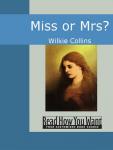
Miss or Mrs?
by Wilkie Collins
Natalie Graybrook is engaged to the much older Richard Turlington whom she detests but who needs her fortune of £40,000 to avoid bankruptcy. She is, however, in love with her cousin Launcelot Linzie. They marry secretly, though Natalie remains with her father Sir Joseph, to avoid a charge of abduction against Launcelot. Turlington, who is sole executor of Sir Joseph's will, learns of the secret marriage and arranges to have Sir Joseph murdered by an accomplice, Wildfang. The plot fails and Turlington is himself killed when his own revolver misfires.

The Two Destinies
by Wilkie Collins
George and Mary are childhood sweethearts in Suffolk's Greenwater Broad. Despite a prediction from Mary's grandmother, old Mrs Dermody, that their two destinies are inextricably linked, George's father disapproves. He separates them by taking his family to America where he subsequently dies. George and his mother return to England where she marries Mr Germaine, a rich suitor she had known before her first marriage.
George has no way of tracing Mary and leads a dissolute existence which prematurely ages his appearance. He reforms, trains to become a surgeon, and takes up an appointment in India. After being wounded in the shoulder, George returns to England where he inherits his step-father's fortune and estate in Perthshire. There is a condition that he must change his name to Germaine.
Mary, meanwhile has suffered a serious illness which has totally changed her looks. She has married a Dutchman called Van Brandt and is also living in the same part of Scotland. When Mary discovers that her marriage is bigamous, she throws herself into the river but is saved by George.
They fail to recognise each other but develop an almost telepathic attraction. George sees an apparition of Mary calling him to Edinburgh. They meet and he learns that Mary had dreamed of him at exactly the same time. She declines his help and he next sees her in London, still in company with Van Brandt. George proposes marriage but Mary, who has a baby daughter, refuses, for fear of spoiling his life.
George goes away to the Shetlands to forget but injures his wounded shoulder. He is nursed back to health by the mysteriously disfigured Miss Dunross to whom he confides his story. On his recovery, he sees another apparition which leads him to Mary and her child, starving in lodgings near St Paul's. Van Brandt is in a debtors prison and George helps by paying off the debts. He again proposes but Mary goes abroad with Van Brandt.
George's mother dies shortly after. Alone and in despair, he returns to Suffolk where he contemplates suicide. He is saved by a third apparition which takes him to the ghost town of Enkhuizen on the coast of Holland. Van Brandt has embezzled money from his old company and abandoned Mary and her child. When she refuses marriage for a third time, George resolves to drown himself and take Mary with him. At the last moment she sees a childhood memento which she once made for him. They finally recognise each other and their two destinies are reunited. Newly married, they are ostracized from society because of malicious scandal. They leave England to start a new life in Naples.
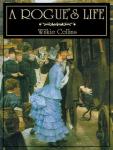
A Rogue's Life
by Wilkie Collins
Frank Softly is a poor young gentleman whose snobbish father sends him to boarding school to make useful connections, but without success. He tries a variety of professions to earn his living but by the time he is twenty-five has failed at medicine, caricaturing, portrait painting, forging Old Masters and administering a scientific institution.
Frank then falls in love with Dr Dulcifer's daughter, Alicia, but discovers that her father is a counterfeit coin maker. Our likeable hero is unwillingly recruited into forging to compromise him as a felon. At this point the doctor considers him unsuitable as a son-in-law and sends Alicia away to Wales. The counterfeiters are betrayed to the Bow Street Runners but Frank escapes, finds Alicia and elopes with her to Scotland. Immediately after their wedding, Frank is arrested, tried and transported to Australia. As a model prisoner he becomes servant to his own wife who has travelled to the New World in the person of a widow. By the time Frank is officially released, their speculations have proved so successful that he is a rich man and a rogue no longer.
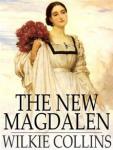
The New Magdalen
by Wilkie Collins
Mercy Merrick has been tricked into the tragic life of a woman of the streets, after a childhood with strolling players and gypsies. She struggles to rehabilitate herself, inspired by a sermon given by a young clergyman, Julian Gray, in the refuge where she was living. Working as a volunteer nurse in the Franco-German war of 1870, she meets Grace Roseberry, a penniless but well-connected and respectable young woman. When Grace is apparently killed by a German shell, Mercy assumes her identity. Armed with a letter of introduction to Grace's relation by marriage, Lady Janet Roy, she is helped to reach England by Horace Holmcroft, a war correspondent and acquaintance of Lady Roy. Mercy is warmly welcomed and becomes her companion and adopted daughter. With Lady Roy's approval, she becomes engaged to Horace.
Grace is not dead, however, since her life has been saved by a German brain surgeon. She returns to England and is introduced to Lady Roy by Julian Gray, but lacking the evidence to back up her claim, is rejected as an imposter. Mercy is about to confess but is antagonised by Grace's vengeful, unforgiving nature. Grace is deemed insane and is about to be confined in an asylum when Mercy once more comes under the influence of Julian Gray, who falls in love with her, and she finally admits her deception. Horace breaks off their engagement while Grace accepts £500 as a bribe for her silence and leaves for Canada. Lady Roy, genuinely fond of Mercy, tries unsuccessfully to persuade her to remain as companion. At first Mercy refuses to marry Julian, in order not to ruin his career and social position. However, he becomes seriously ill and when he recovers Mercy finally agrees to marry him. Rejected by society, they sail to the New World to start life afresh.
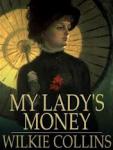
My Lady's Money
by Wilkie Collins
Originally published in 1877, Wilkie Collins's My Lady's Money is a social comedy about theft. A bank note is stolen from Lady Lydiard, and the wrong person is suspected. In order to discover the real thief, Robert Moody, who is in love with Lady Lydiard's adopted daughter Isabel, engages a sloppy investigator, Old Sharon. The novel blends detective fiction with social comedy. A popular and influential English novelist, dramatist, and short story writer, Wilkie Collins (1824-1889) was the son of a famous landscape painter, William Collins. Renowned for his sensational mysteries and romances, he is hailed as the inventor of the detective novel. Collins was a lawyer by training. Among his most famous works are The Woman in White (1860), The Moonstone (1867), and No Name (1862).
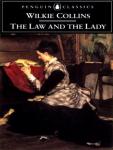
The Law and the Lady
by Wilkie Collins
The book was published in 1875, by Wilkie Collins, although still in print, is largely forgotten now. Not quite as sensational in style as The Moonstone and The Woman in White, it is still a detective story.
Valeria Brinton marries Eustace Woodville despite objections from Woodville's family leading to disquiet for Valeria's own family and friends.
Just a few days after the wedding, various incidents lead Valeria to suspect her husband is hiding a dark secret in his past and she discovers that he has been using a false name. He refuses to discuss it leading them to curtail their honeymoon and return to London where Valeria learns that he was on trial for his first wife's murder by arsenic. He was tried in a Scottish court and the verdict was 'not proven' rather than 'not guilty' implying his guilt but without enough proof for a jury to convict him.
Valeria sets out to save their happiness by proving her husband innocent of the crime. In her quest, she comes across the disabled character Miserrimus Dexter, a fascinating but mentally unstable genius, and his devoted female cousin, Ariel. Dexter will prove crucial to uncovering the disturbing truth behind the mysterious death.
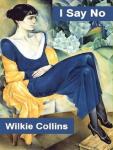
I Say No
by Wilkie Collins
Emily Brown is an orphan girl that almost no one can help but love when they meet her. She is pursued by two worthy men: Mr. Alban Morris, the drawing master at her school; and Rev. Miles Mirabel, a clergyman. However, one of them is lying to her after she discovers that her father's death wasn't natural, as she was led to believe.
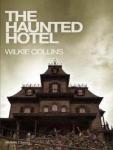
The Haunted Hotel
by Wilkie Collins
'Have you ever heard of the fascination of terror?' This is a unique collection of strange stories from the cunning pen of Wilkie Collins, author of The Woman in White and The Moonstone. The Star attraction is the novella The Haunted Hotel, a clever combination of detective and ghost story set in Venice, a city of grim waterways, dark shadows and death. The action takes place in an ancient palazzo coverted into a modern hotel that houses a grisly secret. The supernatural horror, relentless pace, tight narrative, and a doomed countess characterise and distinguish this powerful tale. The other stories present equally disturbing scenarios, which include ghosts, corpses that move, family curses and perhaps the most unusual of all, the Devil's spectacles, which bring a clarity of vision that can lead to madness.
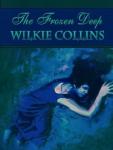
The Frozen Deep
by Wilkie Collins
The Frozen Deep was a play, originally staged as an amateur theatrical, written by Wilkie Collins along with the substantial guidance of Charles Dickens in 1856. Dickens's hand was so prominent – beside acting in the play for several performances, he added a preface, altered lines, and attended to most of the props and sets – that the principal edition of the play is entitled "Under the Management of Charles Dickens". John C. Eckel wrote: "As usual with a play which passed into rehearsal under Dickens' auspices it came out improved. This was the case with The Frozen Deep. The changes were so numerous that the drama almost may be ascribed to Dickens". Dickens himself took the part of Richard Wardour and was stage-manager during its modest original staging in Dickens' home Tavistock House. The play, however, grew in influence through a series of outside performances, including one before Queen Victoria at the Royal Gallery of Illustration, and a three-performance run at the Manchester Free Trade Hall for the benefit of the Douglas Jerrold Fund to benefit the widow of Dickens's old friend Douglas Jerrold. There, night after night, everyone – including, by some accounts, the carpenters and the stage-hands – was moved to tears by the play. It also brought Dickens together with Ellen Ternan, an actress he hired to play one of the parts, and for whom he would leave his wife Catherine. The play remained unpublished until a private printing appeared sometime in 1866.
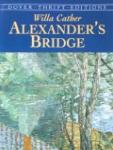
Alexander's Bridge
by Willa Cather
This book is the first novel by American author Willa Cather.
Bartley Alexander is a construction engineer and world-renowned builder of bridges going through what's known today (but not in 1912) as a mid-life crisis. Although married to his wife Winifred, Bartley resumes his acquaintance with a former lover, Hilda Burgoyne, in London. The affair proves to gnaw at Bartley's sense of propriety and honor.
Professor Wilson arrives at the Alexanders' house in Boston, after Mr Alexander has talked him into attending a Congress of Psychologists there. He is greeted by Mrs Alexander; later her husband comes home and they have a talk; his wife plays the piano for them. The next day, she tells him how she met her husband through her aunt.
In London, Bartley Alexander meets with Maurice Mainhall to see a play starring Hilda Burgoyne, an erstwhile lover of his. Back in his hotel room, he thinks back to how he broke up with her in a letter after he met Winifred in Canada. Later, he walks to her house to see where she lives and reminisces about his youth. At a party at Lady Warford's, he talks to her after many years apart and she says she has been reading in the newspapers about his success with bridges in Japan and Canada. Later, he goes to another party also held by Lady Warford. The following Thursday, he takes Hilda to dinner and they reminisce about Madame Anger and Angel, and a beggar they had seen in the street once. He asks her to sing for him and she asks if he will let her love him.
On Christmas Eve, the Alexanders are getting ready for the Christmas dinner, and Bartley tells Wilson he is in trouble with the bridge in Canada. Later, he gives his wife pearl earrings. On New Year's Day, Alexander is getting ready to leave for London again. Later, on the ship, he battles with sharp gales and goes into a bar, where he gambles at bridge. Once in London, Bartley visits Hilda and tells her he cannot go on having two relationships; she must forget about him and leave him alone. She is distressed. The day before he is due to return to America however, he takes her out to dinner.
Later, Hugh MacConnell walks Hilda back to her house on a foggy day, and she says she isn't attracted to him because they are just close friends. Back in her house, she receives a letter from Bartley, saying he is going mad away from her. This prompts her to visit him in America to tell him she will marry another man and thence be bound to someone else; he doesn't like the idea. They spend one last evening together.
Soon after, Bartley is called to Canada by Philip Horton to inspect the bridge. Bartley discovers that one of the lower chords of the bridge was failing, compromising the structural integrity of the entire bridge. Horton was afraid to halt construction, but had first attempted to contact Bartley even earlier - the very day Bartley was with Hilda. As Bartley is on the bridge stopping the work crews, the bridge collapses, killing many of the workers. Bartley's body is recovered the next day and taken to Horton's house. Winifred comes back to look after the dead body. Finally, Wilson visits Hilda. The latter expresses her jealousy over Winifred, but Wilson reminds her that she will not live again, she will be haunted by her husband's death. Hilda concludes that she will be too.
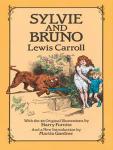
Sylvie and Bruno
by Lewis Carroll
Sylvie and Bruno, first published in 1889, and its 1893 second volume Sylvie and Bruno Concluded form the last novel by Lewis Carroll published during his lifetime. Both volumes were illustrated by Harry Furniss.
The novel has two main plots; one set in the real world at the time the book was published (the Victorian era), the other in the fantasy world of Fairyland. While the latter plot is a fairy tale with many nonsense elements and poems, similar to Carroll's Alice books, the story set in Victorian Britain is a social novel, with its characters discussing various concepts and aspects of religion, society, philosophy and morality.
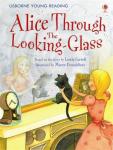
Through The Looking Glass
by Lewis Carroll
This book is a work of literature by Lewis Carroll (Charles Lutwidge Dodgson). It is the sequel to Alice's Adventures in Wonderland (1865). The themes and settings of Through the Looking-Glass make it a kind of mirror image of Wonderland: the first book begins outdoors, in the warm month of May (4 May), uses frequent changes in size as a plot device, and draws on the imagery of playing cards; the second opens indoors on a snowy, wintry night exactly six months later, on 4 November (the day before Guy Fawkes Night), uses frequent changes in time and spatial directions as a plot device, and draws on the imagery of chess. In it, there are many mirror themes, including opposites, time running backwards, and so on.
Alice is playing with a white kitten (whom she calls "Snowdrop") and a black kitten (whom she calls "Kitty")—the offspring of Dinah, Alice's cat in Alice's Adventures in Wonderland—when she ponders what the world is like on the other side of a mirror's reflection. Climbing up on the fireplace mantel, she pokes at the wall-hung mirror behind the fireplace and discovers, to her surprise, that she is able to step through it to an alternative world. In this reflected version of her own house, she finds a book with looking-glass poetry, "Jabberwocky", whose reversed printing she can read only by holding it up to the mirror. She also observes that the chess pieces have come to life, though they remain small enough for her to pick up.
Upon leaving the house (where it had been a cold, snowy night), she enters a sunny spring garden where the flowers have the power of human speech; they perceive Alice as being a "flower that can move about." Elsewhere in the garden, Alice meets the Red Queen (now human-sized), who impresses Alice with her ability to run at breathtaking speeds—a reference to the chess rule that queens are able to move any number of vacant squares at once, in any direction, making them the most "agile" of the pieces. The Red Queen reveals to Alice that the entire countryside is laid out in squares like a gigantic chessboard, and offers to make Alice a queen if she can move all the way to the eighth rank/row in a chess match. Alice is placed in the second rank as one of the White Queen's pawns, and begins her journey across the chessboard by boarding a train that literally jumps over the third row and directly into the fourth rank, acting on the rule that pawns can advance two spaces on their first move.
She then meets the fat twin brothers Tweedledum and Tweedledee, whom she knows from the famous nursery rhyme. After reciting the long poem "The Walrus and the Carpenter", the Tweedles draw Alice's attention to the Red King—loudly snoring away under a nearby tree—and maliciously provoke her with idle philosophical banter that she exists only as an imaginary figure in the Red King's dreams (thereby implying that she will cease to exist the instant he wakes up). Finally, the brothers begin acting out their nursery-rhyme by suiting up for battle, only to be frightened away by an enormous crow, as the nursery rhyme about them predicts.
Alice next meets the White Queen, who is very absent-minded but boasts of (and demonstrates) her ability to remember future events before they have happened. Alice and the White Queen advance into the chessboard's fifth rank by crossing over a brook together, but at the very moment of the crossing, the Queen transforms into a talking Sheep in a small shop. Alice soon finds herself struggling to handle the oars of a small rowboat, where the Sheep annoys her with (seemingly) nonsensical shouting about "crabs" and "feathers". (Unknown to Alice, these are standard terms in the jargon of rowing—and thus the Queen/Sheep, for a change, is speaking in a perfectly logical and meaningful way.)
After crossing yet another brook into the sixth rank, Alice immediately encounters Humpty Dumpty, who, besides celebrating his unbirthday, provides his own translation of the strange terms in "Jabberwocky" (in the process, introducing Alice and the reader to the concept of portmanteau words) before his inevitable fall. "All the king's horses and all the king's men" come to Humpty Dumpty's assistance, naturally, and are accompanied by the White King along with the Lion and the Unicorn, who again proceed to act out a nursery rhyme by fighting each other. In this chapter, the March Hare and Hatter of the first book make a brief re-appearance in the guise of "Anglo-Saxon messengers" called "Haigha" and "Hatta" (i.e. "Hare" and "Hatter"—these names are the only hint given as to their identities other than John Tenniel's illustrations).
Upon leaving the Lion and Unicorn to their fight, Alice reaches the seventh rank by crossing another brook into the forested territory of the Red Knight, who is intent on capturing the "white pawn" Alice until the White Knight comes to her rescue. Escorting her through the forest towards the final brook-crossing, the Knight recites a long poem of his own composition, and repeatedly falls off his horse—his clumsiness is a reference to the "eccentric" L-shaped movements of chess knights, and may also be interpreted as a self-deprecating joke about Lewis Carroll's own physical awkwardness and stammering in real life.
Bidding farewell to the White Knight, Alice steps across the last brook and is automatically crowned a queen (the crown materialising abruptly on her head). She soon finds herself in the company of both the White and Red Queens who relentlessly confound Alice by using word play to thwart her attempts at logical discussion. They then invite one another to a party that will be hosted by the newly crowned Alice (of which Alice herself had no prior knowledge). Alice arrives and seats herself at her own party which quickly turns to a chaotic uproar (much like the ending of the first book) in which Alice finally grabs the Red Queen, believing her to be responsible for all the day's nonsense, and begins shaking her violently with all her might. (By thus "capturing" the Red Queen, Alice unknowingly puts the Red King—who has remained stationary throughout the book—into checkmate, and is allowed to wake up.) Alice suddenly awakes in her armchair to find herself holding the black kitten, whom she deduces to have been the Red Queen all along, with the white kitten having been the White Queen. The story ends with Alice recalling the speculation of the Tweedle brothers, that everything may have, in fact, been a dream of the Red King and that Alice might herself be no more than a figment of his imagination. One final poem is inserted by the author as a sort of epilogue which suggests that life itself is but a dream.
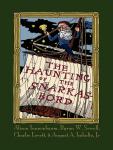
The Hunting of the Snark
by Lewis Carroll
After crossing the sea guided by the Bellman's map of the Ocean—a blank sheet of paper—the hunting party arrive in a strange land. The Baker recalls that his uncle once warned him that, though catching Snarks is all well and good, you must be careful; for, if your Snark is a Boojum, then you will softly and suddenly vanish away, and never be met with again. With this in mind, they split up to hunt. Along the way, the Butcher and Beaver -previously mutually wary for the Butcher's specialty in preparing beavers- become fast friends, the Barrister falls asleep and dreams of a court trial defended by the Snark, and the Banker loses his sanity after being attacked by a frumious Bandersnatch. At the end, the Baker calls out that he has found a Snark; but when the others arrive he has mysteriously disappeared, 'For the Snark was a Boojum, you see'.